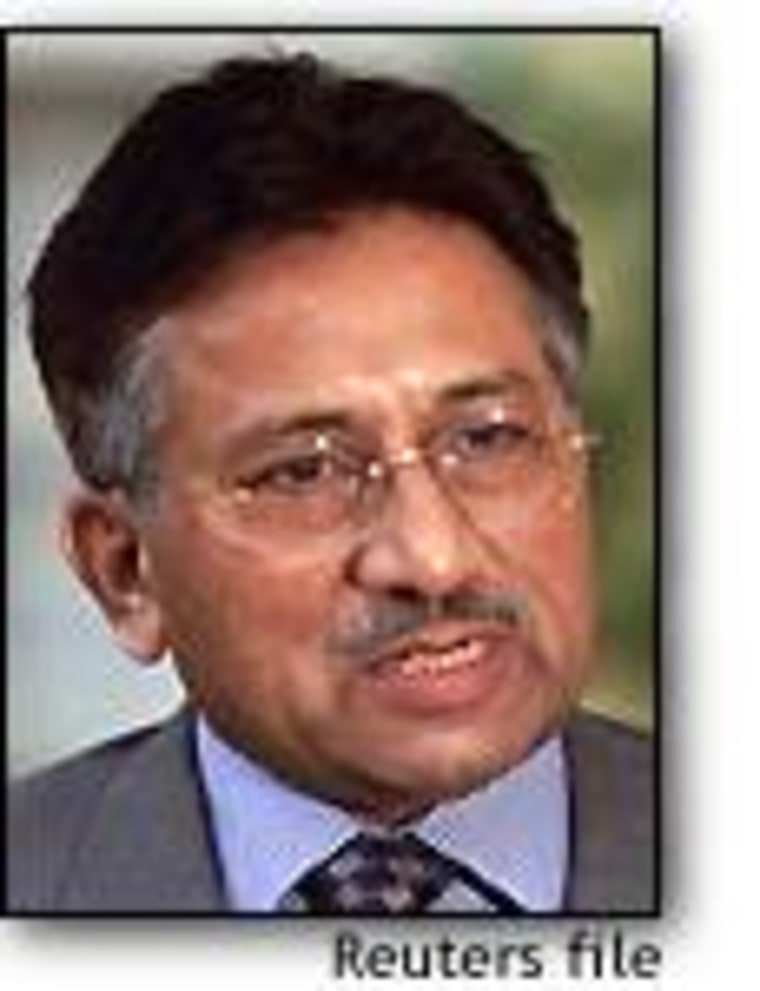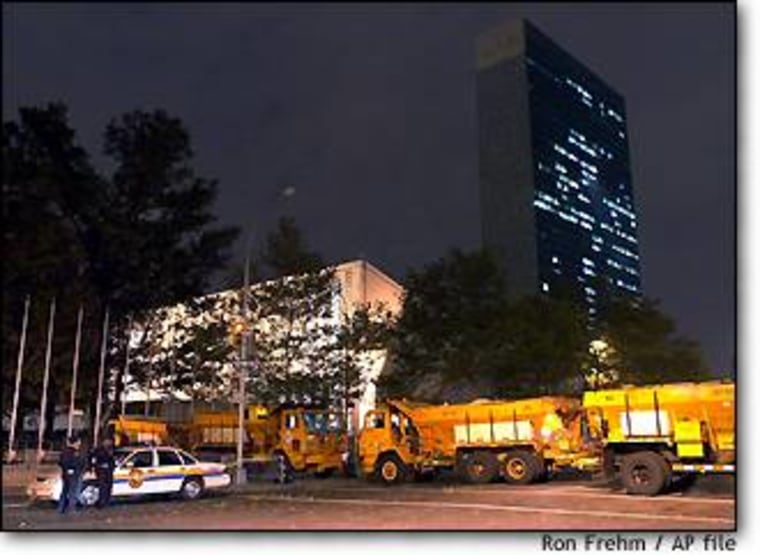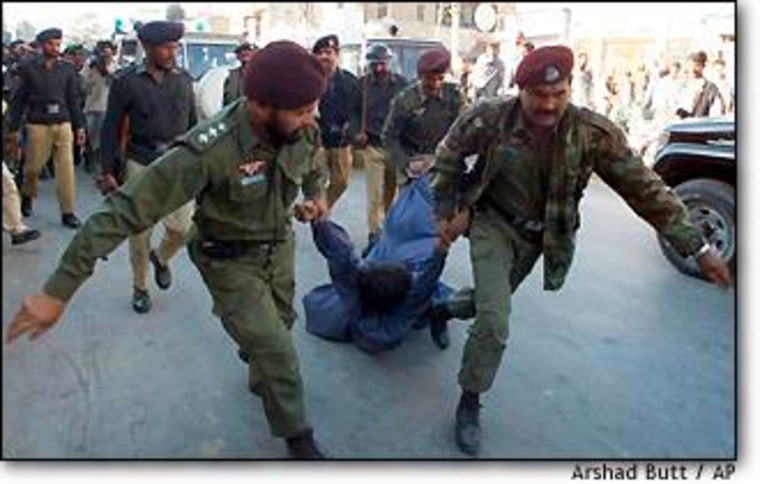The Saturday summit in New York between President Bush and Pervez Musharraf comes at a precarious time for the Pakistani leader. Having thrown his lot in with the U.S. war effort in Afghanistan, Musharraf finds himself out of step with much of his Muslim nation and key elements of its military establishment. Yet U.S. officials and a senior Muslim diplomat here tell MSNBC.com that Musharraf’s decision to attend the opening of the U.N. General Assembly this weekend shows he has more confidence in his own grip on power than his American allies do.
THE MEETING will take place on the eve of the two- month anniversary of the Sept. 11 attacks and a week ahead of the start of the Muslim holy month of Ramadan. Those two events perfectly frame the dilemma facing Musharraf. The Pakistani president, according to official sources, will attempt to offer condolences and maximum support to the United States while dealing with growing unhappiness at home about his support for the American war effort.
“It is not wrong to say there is a split inside Pakistan,” said a senior diplomat from an Islamic country. “But there is no threat of a coup or revolution. That is overstating the power of the groups behind the unrest. Musharraf has critics, but he has the army’s loyalty.”
Musharraf has already used his trip as an effort to convince the U.S. to call a halt to the war during Ramadan. In Paris Thursday, Musharraf said that the war “is being perceived in the whole world ... as if this were a war against the poor, miserable and innocent people of Afghanistan.” He said he would bring the issue up with Bush on Saturday.
Neither the United States nor Britain have given Musharraf any open sign that this request will be granted. U.S. officials, including Secretary of Defense Donald Rumsfeld, have politely promised to consider his admonitions concerning Ramadan. But officially at least, there is no talk of a planned pause. Indeed, British Prime Minister Tony Blair was more blunt Thursday after meeting Musharraf. “In the end, I think everyone understands that the campaign has to continue ultimately until the objectives are secured,” he said.
BETTER TO TRY AND FAIL ...?
Some officials say that Musharraf understands that fighting will not cease during Ramadan, and that his entreaties for a halt are a public-relations effort designed to deflect criticism from devout Muslims in his own nation. While some analysts suggest that his pleas for a lull reflect a desperate domestic situation, others say his decision to leave Pakistan for a prolonged foreign trip indicates the opposite.
A senior Islamic diplomat noted that Musharraf had come to power himself in a coup that began when then-Pakistani President Nawaz Sharif attempted to deny the general’s aircraft permission to land in Islamabad. “He understands the dangers of leaving,” the diplomat said. “He isn’t doing this lightly.”
Musharraf himself addressed the question in a response to reporters in London. “Our army is extremely disciplined army,” he said. “The army is with me and they will always remain behind me. I am the leader and they will follow me.”
COVERING HIS BETS
Still, U.S. officials note Musharraf has not been shy about cracking down on any sign that dissent poses a danger to his government.
Soon after the U.S. airstrikes in Afghanistan began, Musharraf arrested the most outspoken leaders of Pakistan’s small Islamic opposition parties ordering a shake-up in the notorious intelligence service, the ISI, removing top officials who were sympathetic to Afghanistan’s Taliban regime. The ISI is often credited with assisting Taliban forces in their successful campaign against the Mujahideen. Until Sept. 11, Pakistan remained the Taliban’s most important ally — a fact that leads some critics in the United States and elsewhere to wonder whether Musharraf can cut the Taliban loose and still survive in office.
Musharraf continues to take steps to ensure he will survive. While Pakistani newspapers put his calls for a Ramadan truce on their front pages, Musharraf’s security forces have arrested several more Islamic leaders, banned demonstrations and prohibited mosques from using their ubiquitous loudspeakers to broadcast political messages.

On Thursday, his military shut down the Taliban consulates in Quetta and Peshawar, two border towns that are hotbeds of support for the Afghan regime. But Musharraf, again hedging his bets, has said he will not break ties completely with the Taliban, arguing that the open diplomatic channels could prove to be a key to capturing Osama bin Laden.
MUSHARRAF’S GOALS
Despite the unenviable position Musharraf finds himself in, the fact that Pakistan is the most important item on the American president’s agenda this Saturday is an extraordinary turnabout after many years of United States consistently tilting towards India, Pakistan’s prime adversary. Musharraf needs to emphasize the importance of this change for his domestic audience. Dr. Robert Braddock, an expert in Pakistan at Kings College, London, told MSNBC that clear economic and political signals from the United States could show Pakistanis that Musharraf’s decision will have advantages that make the unpleasant betrayal of their Afghan allies more than worthwhile.

“He’s got to show not only that Pakistan has been welcomed back into the international community, but welcomed back in such a way that the States and Britain — and the international community as a whole — will take Pakistan’s situation seriously,” Braddock said.
Pakistan currently owes $38 billion to foreign banks and international lending institutions, a sum the nation has no hope of paying without significant debt relief. Japanese and American banks hold the bulk of that debt, and a move by Bush on that count would be a boon to Musharraf’s support among the middle classes and the elites. How America balances its interests between India and Pakistan may be the ultimate factor in determining Musharraf’s fate.
